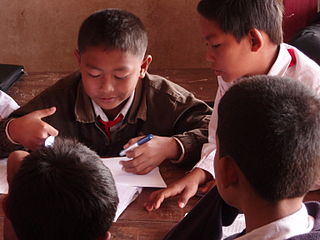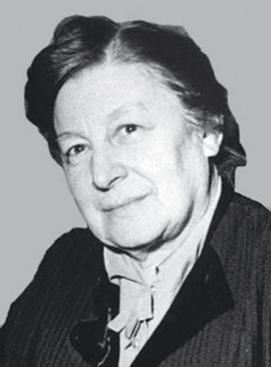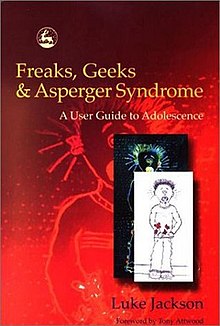
Asperger syndrome (AS), also known as Asperger's, is a neurodevelopmental condition characterized by significant difficulties in social interaction and nonverbal communication, along with restricted and repetitive patterns of behaviour and interests. The syndrome is no longer recognised as a diagnosis in itself, having been merged with other conditions into autism spectrum disorder (ASD). It was considered to differ from other diagnoses that were merged into ASD by relatively unimpaired spoken language and intelligence.

Attention deficit hyperactivity disorder (ADHD) is a neurodevelopmental disorder characterised by excessive amounts of inattention, hyperactivity, and impulsivity that are pervasive, impairing in multiple contexts, and otherwise age-inappropriate.
Developmental disorders comprise a group of psychiatric conditions originating in childhood that involve serious impairment in different areas. There are several ways of using this term. The most narrow concept is used in the category "Specific Disorders of Psychological Development" in the ICD-10. These disorders comprise developmental language disorder, learning disorders, motor disorders, and autism spectrum disorders. In broader definitions ADHD is included, and the term used is neurodevelopmental disorders. Yet others include antisocial behavior and schizophrenia that begins in childhood and continues through life. However, these two latter conditions are not as stable as the other developmental disorders, and there is not the same evidence of a shared genetic liability.
Autism spectrum difference (ASD) is a developmental difference that begins in early childhood, persists throughout adulthood, and affects three crucial areas of development: communication, social interaction and restricted patterns of behavior. There are many conditions comorbid to autism spectrum disorder such as fragile X syndrome and epilepsy.

Neurodiversity refers to diversity in the human brain and cognition, for instance in sociability, learning, attention, mood, and other mental functions. It gives an inclusive view of cognitive diversity, highlighting the differences at a neuro-biological level while considering the socio-cultural contexts of a human's lived experience.
Lars Christopher Gillberg, who has sometimes published as Gillberg and Gillberg with his wife Carina Gillberg, is a professor of child and adolescent psychiatry at Gothenburg University in Gothenburg, Sweden, and an honorary professor at the Institute of Child Health (ICH), University College London. He has also been a visiting professor at the universities of Bergen, New York, Odense, St George's, San Francisco, and Glasgow and Strathclyde.
High-functioning autism (HFA) is an autism classification where a person exhibits no intellectual disability, but may exhibit deficits in communication, emotion recognition and expression, and social interaction. HFA is not included in either the American Psychological Association's DSM-5 or the World Health Organization's ICD-10, neither of which subdivides autism based on intellectual capabilities.
Nonverbal learning disability (NVLD) is a neurodevelopmental disorder characterized by core deficits in visual-spatial processing in the presence of intact verbal ability. Additional diagnostic criteria include Average to Superior verbal intelligence and deficits in visuoconstruction abilities, fine-motor coordination, mathematical reasoning, visuospatial memory and social skills. In clinical settings, some diagnoses of attention deficit hyperactivity disorder would be more appropriately classified as NVLD.
The following outline is provided as an overview of and topical guide to autism:
Jacqueline Carol Jackson is a British writer who consults, counsels, speaks and writes on most autism issues. Her doctoral thesis, entitled 'Nurturing the Engagement of Children with an Autism Spectrum Disorder through Digital Polysensory Experiences', awarded from Coventry University, analysed the sensory differences of children with an ASD and the impact of the digital and built environment. Jackson is a single mother of eight children, three daughters and five sons, of whom all five sons and one daughter are on the autism spectrum. Jackson and her family appeared in a BBC documentary titled My Family and Autism in 2003. A drama film called Magnificent 7 starring Helena Bonham Carter as Maggi, a character based on Jackson, aired on BBC Two in 2005. Jackson lives in Blackpool.
The epidemiology of autism is the study of the incidence and distribution of autism spectrum disorders (ASD). A 2022 systematic review of global prevalence of autism spectrum disorders found a median prevalence of 1% in children in studies published from 2012 to 2021, with a trend of increasing prevalence over time. However, the study’s 1% figure may reflect an underestimate of prevalence in low- and middle-income countries.
The empathising–systemising (E–S) theory is a theory on the psychological basis of autism and male–female neurological differences originally put forward by English clinical psychologist Simon Baron-Cohen. It classifies individuals based on abilities in empathic thinking (E) and systematic thinking (S). It measures skills using an Empathy Quotient (EQ) and Systemising Quotient (SQ) and attempts to explain the social and communication symptoms in autism spectrum disorders as deficits and delays in empathy combined with intact or superior systemising.
Asperger syndrome (AS) was formerly a separate diagnosis under autism spectrum disorder. Under the DSM-5 and ICD-10, patients formerly diagnosable with Asperger syndrome are diagnosable with Autism Spectrum Disorder. It is now an outdated term, and is considered offensive by many autistic individuals. It was named after Hans Asperger (1906–80), who was an Austrian psychiatrist and pediatrician. An English psychiatrist, Lorna Wing, popularized the term "Asperger's syndrome" in a 1981 publication; the first book in English on Asperger syndrome was written by Uta Frith in 1991 and the condition was subsequently recognized in formal diagnostic manuals later in the 1990s. Details of Hans Asperger's actions as a psychiatrist in Nazi era Austria, made public in 2018, incited debate of the syndrome's name and public lobbying for a renaming of the syndrome.

Kanner syndrome, officially childhood autism, was a neurodevelopmental diagnosis before the release of the DSM-5 and ICD-11. It has been superseded by autism spectrum disorder. In daily speech it is often referred to as "classic autism", or "Kanner autism."
Social thinking or thinking socially refers to a methodology created by Michelle Garcia Winner; it is described as a piece we all go through in our minds as we try to make sense of our others’ thoughts, feelings, and intentions in context, whether we are existing, actively interacting, or figuring out what is happening from a distance. Our ability to think socially is part of social learning that begins at birth and evolves across our lifetime. Social thinking in this context, is also referred to as social cognition.

The autism spectrum, often referred to as just autism, autism spectrum disorder (ASD) or sometimes autism spectrum condition (ASC), identifies a loosely defined cluster of neurodevelopmental disorders characterized by challenges in social interaction, verbal and nonverbal communication, and often repetitive behaviors and restricted interests. Other common features include unusual responses to sensory stimuli and a preference for sameness or unusual adherence to routines.
The history of autism spans over a century, autism has been subject to varying treatments, being pathologized or being viewed as a beneficial part of human neurodiversity. The understanding of autism has been shaped by cultural, scientific, and societal factors throughout history, and its perception and treatment change over time as scientific understanding of autism develops.
Low-functioning autism (LFA) is a degree of autism marked by difficulties with social communication and interaction, challenging behavior, and differences in social or emotional reciprocity. Sleep problems, aggression, stereotypical, and self-injurious behavior are also common symptoms. LFA is not a recognized diagnosis in the DSM-5 or ICD-10, as neither subdivides autism based on intellectual capabilities.

Grunya Yefimovna Sukhareva was a Soviet child psychiatrist. She was the first to publish a detailed description of autistic symptoms in 1925. The original paper was in Russian and published in German a year later. Sula Wolff translated it in 1996 for the English-speaking world.
Brenda Smith Myles, Ph. D. is an American author and researcher on the topic of the autism spectrum. As of 2021, she has written more than 300 articles and books on autism spectrum disorder. She was once found to be the world's second most productive applied researcher in ASD, by the University of Texas.






